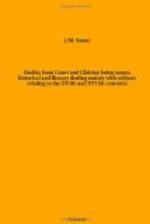“Confessing as they do that ours is the Catholic Church, they contradict their own belief in the said creed; and not only this, but the ancient Fathers, and the Holy Scriptures agree that the Church of God is one.
“Having added many other things to this proposition, I said that if one examined the reasons which induced Henry VIII. to give up the Church, one would find that they had no other origin than in sensuality and spleen—false and unworthy pretexts.
“I ended by declaring that whoever considers a matter so important as is the salvation of souls, ought to have his eyes well open, and not consent to the errors of that king, whose actions are condemned and abhorred by all.
“Mr. Windebank replied that he had listened to me with pleasure, and had weighed all my reasons, finding them very true; but that for the accomplishment of an undertaking so momentous, a large heart and a strong will were indispensable, and these he could not at present promise me. He told me in confidence that never until now had negotiations of such importance passed through his hands, to be followed by so few results. One day the King would have recourse to an expedient, and the next would stultify it, with the greatest inconstancy imaginable. Nevertheless, he assured me that he would not fail to repeat all I had said, to his Majesty at the first opportunity.
“. . . The matter is indeed so grave, that one rather hopes in the sovereign power of God than in any human help. Still, we must be ready, for His Divine Majesty often makes use of us creatures to bring forth works which shall redound to His service.
“I observed both with Father Philip and Mr. Windebank all the caution that such an important undertaking demands. May God who gives and who takes away realms, who changes and governs them as He pleases, enlighten the King’s mind, that he may know what he should do for the salvation of his own soul and the souls of all his people.”
In 1641 many letters were written and received by Count Rosetti, relating to the freedom of conscience to be granted to Catholics, in return for a sum of 600 scudi. But freedom of conscience was still one of the unfulfilled conditions of the king’s marriage settlement, and the Pope, it was objected, could not treat with an heretical sovereign.
“Only in the event of the King’s conversion,” wrote Cardinal Barberini, 21st February 1641, “would it be possible for me to entreat His Holiness to send a considerable sum of money.”
On the 19th July of the same year, Rosetti wrote:—
“I told him (Father Philip) that the only way to obtain help from the Holy See was by His Majesty’s return to the Catholic Church. He answered that such a step would be extremely difficult at present, not because the King had any dislike to Catholicism, neither did he wish to prevent Catholics from saving their souls; but that it was evident if he changed his religion just now, he would run great risk of losing his crown and his life. But if he were enabled to recover his power and authority, the Catholic cause would be strengthened by supporting him, and his conversion might then be confidently looked forward to.




